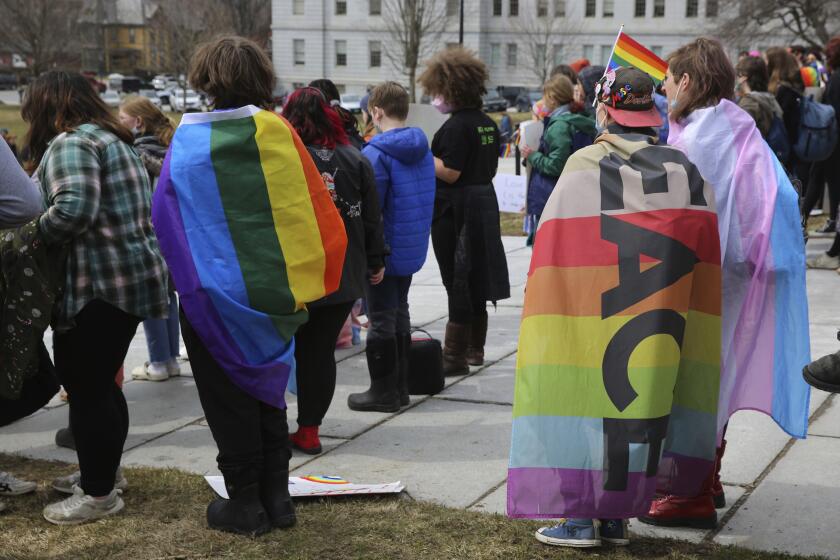Federal judge blocks much of Indiana’s ban on gender-affirming care for minors

- Share via
INDIANAPOLIS — A federal judge has issued an order stopping an Indiana ban on puberty blockers and hormones for transgender minors from taking effect as scheduled July 1.
The American Civil Liberties Union of Indiana sought the temporary injunction in its legal challenge to the Republican-backed law, which was passed this spring amid a national push by GOP-led legislatures to curb LGBTQ+ rights.
The order from U.S. District Judge James Patrick Hanlon will allow the law’s prohibition on gender-affirming surgeries to take effect. Hanlon’s order on Friday also blocks provisions that would prohibit Indiana doctors from communicating with out-of-state doctors about gender-affirming care for their patients under 18.
The ACLU filed the lawsuit within hours after Republican Gov. Eric Holcomb signed the bill April 5. The challenge, on behalf of four young people undergoing transgender treatments and an Indiana doctor who provides such care, argued the ban would violate the U.S. Constitution’s equal protection guarantees and trample on the rights of parents to decide their children’s medical treatment.
A new Florida law banning gender-affirming care for minors is getting a lot of attention nationally as Republican Gov. Ron DeSantis runs for president, but it’s also affecting transgender adults.
Indiana’s Republican-dominated Legislature approved the ban after contentious hearings that featured primarily testimony from vocal opponents, with many arguing that gender-affirming care lowered the risk of depression and suicide among transgender youth.
Hanlon, who was appointed by former President Trump, wrote that he was blocking the law from taking effect because its opponents had demonstrated potential irreparable harm to those undergoing treatment and shown “some likelihood of success” in arguments that it was unconstitutional.
The ACLU had provided “evidence of risks to minors’ health and wellbeing from gender dysphoria if those treatments can no longer be provided to minors — prolonging of their dysphoria, and causing additional distress and health risks, such as depression, posttraumatic stress disorder, and suicidality,” Hanlon said.
On Transgender Day of Visibility, people across the country gather for events to build support for transgender rights.
ACLU leaders hailed the ruling as a victory in the fight “to defend the right of all trans people to be their authentic selves, free from discrimination.”
“We won’t rest until this unconstitutional law is struck down for good,” Ken Falk, the ACLU of Indiana’s legal director, said in a statement.
At least 20 GOP-led states have enacted laws restricting or banning such medical treatments for transgender minors since Missouri’s governor signed that state’s bill into law last week.
Lawsuits have been filed in several states against transgender treatment bans. Federal judges have also blocked enforcement of such laws in Alabama and Arkansas, and Oklahoma has agreed to not enforce its ban while opponents seek a temporary court order to block.
Indiana bill sponsor Rep. Joanna King, a Republican, said as the ban was being debated that it would “protect our children from irreversible, harmful, life-altering procedures.”
The Indiana attorney general’s office didn’t immediately reply to a request for comment on Hanlon’s ruling and whether it would attempt to appeal the injunction before July 1. The provisions of the law that were blocked gave trans youth until Dec. 31 to stop taking medication to transition.
A top attorney for the state told Hanlon during a court hearing Wednesday that gender-affirming treatments during puberty could risk future fertility, bone strength, brain development and reversibility and had not been adequately studied by scientists.
Such factors make it within the Legislature’s authority to decide “we don’t want our children to be part of this grand experiment,” Indiana Solicitor Gen. Thomas Fisher said.
Though guidelines from leading authorities on gender-affirming medical care already say surgery generally should be reserved for adults, with exceptions for older teens who meet certain criteria, the Indiana law calls for an immediate ban on gender-affirming surgeries for minors.
The provisions of the law banning those surgeries will have no immediate effect. Hanlon wrote in his ruling that no medical providers in the state were performing those procedures on people younger than 18.
More to Read
Sign up for Essential California
The most important California stories and recommendations in your inbox every morning.
You may occasionally receive promotional content from the Los Angeles Times.














